Rethinking Orthodox Millennials: A Conversation with Rabbi Ilan Haber
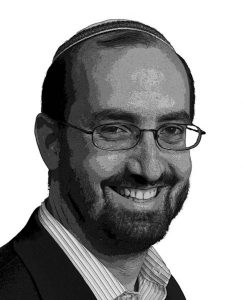 For the past twelve years, Rabbi Ilan Haber has served as the national director of the Heshe and Harriet Seif Jewish Learning Initiative on Campus (OU-JLIC), a program that places rabbinical couples on college campuses to serve as educators and mentors to students. Rabbi Haber began his career as an OU-JLIC educator, along with his wife, at Yale University. He has served as Hillel’s national director of accreditation, as a senior consultant in its Department of Campus Strategic Services and as a campus rabbi at The George Washington University. Rabbi Haber holds a BA in English literature and semichah from Yeshiva University. He also has an MPA with a concentration in strategic management and evaluation from The George Washington University. He currently resides with his wife, Leah, and their five children in Ramat Beit Shemesh, Israel.
For the past twelve years, Rabbi Ilan Haber has served as the national director of the Heshe and Harriet Seif Jewish Learning Initiative on Campus (OU-JLIC), a program that places rabbinical couples on college campuses to serve as educators and mentors to students. Rabbi Haber began his career as an OU-JLIC educator, along with his wife, at Yale University. He has served as Hillel’s national director of accreditation, as a senior consultant in its Department of Campus Strategic Services and as a campus rabbi at The George Washington University. Rabbi Haber holds a BA in English literature and semichah from Yeshiva University. He also has an MPA with a concentration in strategic management and evaluation from The George Washington University. He currently resides with his wife, Leah, and their five children in Ramat Beit Shemesh, Israel.
Jewish Action: Millennials are constantly maligned in the media. They are often accused of being lazy, narcissistic and entitled. Do you agree? What, in your view, are the unique characteristics of this population?
Rabbi Ilan Haber: I know it’s fashionable to deride millennials as being self-centered and unambitious. But the millennials I interact with do not conform to these stereotypes. As a whole, I find them to be more optimistic and more networked and interconnected both to each other and to their families than my generation [Generation X]. They are less cynical about the world and about their own limitations, and I get a sense that they really want to have an impact. They genuinely care about others; they tend to be very involved in social activism. Millennials are genuinely open to new experiences and ideas but are very discerning. They are not gullible. You need to be cogent and compelling if you want their attention.
JA: Your work with OU-JLIC has made you somewhat of an expert on college youth. Can you tell us about some of the challenges facing Orthodox millennials on campus?
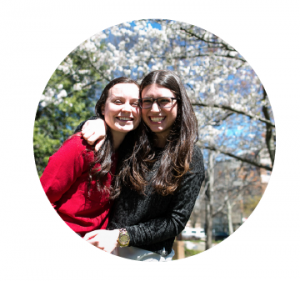 RH: From my vantage point, there are three primary challenges. Firstly, it is becoming increasingly common on campus to consider any limitation on personal freedom and personal choice as immoral.
RH: From my vantage point, there are three primary challenges. Firstly, it is becoming increasingly common on campus to consider any limitation on personal freedom and personal choice as immoral.
Not different. Immoral.
This is, of course, in direct contrast with Yahadut, which recognizes that we’re limited in all sorts of different ways. We’re limited emotionally, we’re limited by time, we’re limited by our own perspectives. Limitations are part and parcel of the human experience, and certainly part and parcel of the experience of being a religious Jew. If I’m born a Yisrael and not a Kohen, I can’t be involved in certain aspects of avodat Hashem. We’re supposed to embrace those limitations and find ways to engage with HaKadosh Baruch Hu and our religion despite those limitations.
These opposing attitudes—viewing limitations as immoral and viewing them as being inherent to the human experience—inevitably conflict. Many of the ideological struggles taking place in the broader society are a manifestation of this clash. For the observant student, what happens when the Torah says one thing and society another? What happens when we can’t embrace certain behaviors that society values because the Torah says that these behaviors are simply wrong? That clash is and continues to be especially challenging for religious students.
On the campus these days, there is an emphasis on tolerance—appreciation for and accommodation of difference in society. That in and of itself is a positive thing, and leads people to accept one another and be less judgmental. But I am concerned that this tolerance is just a veneer, that it only applies to those who fit into a certain narrative. That narrative is largely defined by multiculturalism and progressive liberalism. When one doesn’t fit into that narrative, suddenly people aren’t so tolerant anymore. Those who do not recognize certain progressive ideas as inviolable become targets.
JA: What are other ideas or ideologies prevalent among millennials that challenge the religious worldview?
 RH: A second challenge is the accentuation of the individual, which relates back to the previous idea—the limits on personal freedom. There’s a tremendous emphasis in our society to think differently, to be different, to emerge as someone who’s unique. This creates anxiety because it sets up the expectation that one must have an individualized identity that is different from everyone else.
RH: A second challenge is the accentuation of the individual, which relates back to the previous idea—the limits on personal freedom. There’s a tremendous emphasis in our society to think differently, to be different, to emerge as someone who’s unique. This creates anxiety because it sets up the expectation that one must have an individualized identity that is different from everyone else.
In previous generations, people were much more willing to identify with a particular group. One of the most fascinating conversations I’ve had about dealing with collegiate students was with a college advisor for an African American affinity group at a particular campus. She told me that she has a very difficult time persuading students to identify with any one group or association, even when they agree with its particular values. The way she put it was quite striking: “If I created a group called non-racists and asked people to affiliate, it would be difficult to get them to wear a pin stating they were part of the non-racist group. They do not want to put themselves in a box.”
This is not a Jewish issue; this is a far broader phenomenon. The Pew Research Center conducted important studies about millennials, some of which point to a reticence to identify with institutions, both religious and political. Millennials, for example, may have values that would put them in line with the Democratic Party but they do not want to affiliate and prefer to call themselves Independents.
Whenever OU-JLIC sends out a survey and asks collegiates how they identify, this issue becomes apparent. Many respondents will say, “I’m just Jewish,” “I’m just religious” or “I’m halachic.” They’ll come up with their own terms even if they adhere to halachah and fit within an Orthodox ideology; they’re not ready to identify themselves as Orthodox. They are more comfortable identifying as post-denominational, post-Orthodox or post-Modern Orthodox.
JA: How does this extreme emphasis on the individual affect religious life?
 RH: That’s a good question. As a result of the accentuation of the individual, religion has become more of a consumer experience. With the assistance of technology, everything in our society can be adjusted or modified to individual needs or specifications. Most of our needs are customized in this technological era and very few things are “one size fits all.” People begin to expect the same customized approach from their religion.
RH: That’s a good question. As a result of the accentuation of the individual, religion has become more of a consumer experience. With the assistance of technology, everything in our society can be adjusted or modified to individual needs or specifications. Most of our needs are customized in this technological era and very few things are “one size fits all.” People begin to expect the same customized approach from their religion.
To illustrate: when an individual feels that the most important aspect in life is his ability to pursue his own personal freedoms, religion can easily become something to feed into his own self-fulfillment.
This mentality can cause one to believe that Judaism too has to be about accentuating or maximizing one’s own need for self-fulfillment rather than about serving God. On the Internet, for example, when we come across something that makes us uncomfortable or doesn’t connect to something we value or enjoy, we discard it. What happens when this perspective begins to permeate our religious identity and experience? This also, by the way, encourages educators and mechanchim to package religion as if it were a consumer product.
JA: Can you give an example of how an educator might do that?
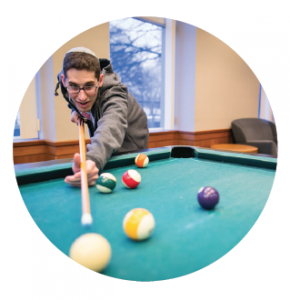 RH: “Consumer Judaism” centers around the needs and wants of the “consumer.” For example, instead of a teacher providing his or her students with challenges that make them grapple or work towards understanding a concept in the Torah, he provides sound bites and easily digestible ideas that reaffirm rather than challenge these students’ notions about the world and about themselves.
RH: “Consumer Judaism” centers around the needs and wants of the “consumer.” For example, instead of a teacher providing his or her students with challenges that make them grapple or work towards understanding a concept in the Torah, he provides sound bites and easily digestible ideas that reaffirm rather than challenge these students’ notions about the world and about themselves.
“Consumer Judaism” leads to “I don’t go to shul because I want to be part of a community; I go to shul because I want a certain kind of experience.” In other words, the individuation of religious identity further breaks down the notions of community, community service and community connection. Millennials especially are very engaged in social justice, social action, tzedakah and all sorts of altruistic endeavors, all of which are very positive. However, I’m afraid that for many of them, these endeavors could become avenues toward their own self-fulfillment. For some millennials, the motivation for engaging in good deeds is “I’m a good person and I want to express that goodness in some way.” Once again, it becomes about the individual rather than about religious duty or obligation.
I once gave a shiur about the importance of davening with the tzibbur. This idea bothered one of the young participants who came up to me afterward and posed the following: “Let’s say I face a sunset while davening and that enables me to achieve my greatest deveikut with HaKadosh Baruch Hu; why isn’t that a better experience than going to shul where I don’t feel the spirituality as deeply or not even at all?”
That question encapsulates the challenge—the idea that ultimately davening should be about me maximizing my own avodat Hashem. What this young man is saying is essentially this—the way I feel when I connect to HaKadosh Baruch Hu is more important than being part of and contributing towards a communal endeavor. This is rooted in the individuation of religion.
JA: You mentioned three challenges. What is the third?
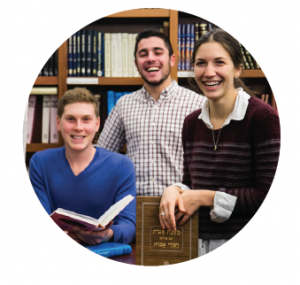 RH: The third challenge is the breakdown of the boundaries between the private and public realms. For many millennials, in order for an experience to have value, it needs to be shared with others. It needs to be posted on social media and people have to like it and comment on it. Firstly, there is the issue of mindfulness. Instead of “being in the moment” and feeling an experience, people believe that they need a photo or a recording of an event or else it is not meaningful. Secondly, and even more importantly, what happened to the value of tzeniut, of not sharing all our internal things, of having a private realm in which to function? When Bilaam gave a berachah to the Jewish people, he said, “Mah tovu ohalecha Yaakov, mishkanotecha Yisrael, How goodly are your tents, Jacob, your dwelling places, Israel.” Chazal ask, “What was he praising? What was praiseworthy about the tents of Bnei Yisrael?” The answer is that the windows weren’t facing each other, so they couldn’t see into each other’s homes. There was a distinction between our public persona and our private persona.
RH: The third challenge is the breakdown of the boundaries between the private and public realms. For many millennials, in order for an experience to have value, it needs to be shared with others. It needs to be posted on social media and people have to like it and comment on it. Firstly, there is the issue of mindfulness. Instead of “being in the moment” and feeling an experience, people believe that they need a photo or a recording of an event or else it is not meaningful. Secondly, and even more importantly, what happened to the value of tzeniut, of not sharing all our internal things, of having a private realm in which to function? When Bilaam gave a berachah to the Jewish people, he said, “Mah tovu ohalecha Yaakov, mishkanotecha Yisrael, How goodly are your tents, Jacob, your dwelling places, Israel.” Chazal ask, “What was he praising? What was praiseworthy about the tents of Bnei Yisrael?” The answer is that the windows weren’t facing each other, so they couldn’t see into each other’s homes. There was a distinction between our public persona and our private persona.
There’s “tov”—a positive value—in being private that is even codified in halachah. Note, for example, the laws regarding hezek re’iyah—building fences between neighbors and not having windows facing each other. This concept needs to be applied on a personal level. Recently, I heard about a young man who had posted a yichud room selfie online. The idea that one would post a photo of himself in the yichud room, the most private of private places that represents the intimacy between husband and wife, highlights some of the challenges we face.
JA: How should Orthodox students on campus respond to these ideologies or ways of thinking that are not consistent with the Torah way of life?
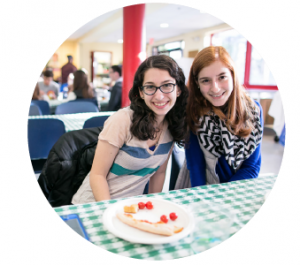 RH: When I speak to college students, I often point out that it’s okay to be countercultural. If one says, “I’m sorry that my view doesn’t completely conform to societal values, but this is who I am”—that would be valued. If you state your position with authenticity, confidence and pride, and do not second-guess yourself, your position will likely be respected. Sincerity is very well respected among millennials.
RH: When I speak to college students, I often point out that it’s okay to be countercultural. If one says, “I’m sorry that my view doesn’t completely conform to societal values, but this is who I am”—that would be valued. If you state your position with authenticity, confidence and pride, and do not second-guess yourself, your position will likely be respected. Sincerity is very well respected among millennials.
Some Jewish organizations trying to reach millennials are constantly chasing after the cool, trying to be the most “with it.” Firstly, they will always be second in that race. It might be cool to be the first person there, but it’s never cool to be the second or third person. Secondly, trying to be the coolest is unnecessary. Millennials respond to self-confidence and authenticity. Even if one’s message is countercultural, stating it strongly and plainly can encourage people to think for themselves and to resist some of these larger societal messages that impede their own religious development.
I also remind students that community is about unity, not uniformity. Being part of something doesn’t mean we’re putting you in a box or saying that you have to be exactly like everybody else. In fact, we embrace each person’s uniqueness; we embrace the individuality that everyone brings and that individuality actually enhances the need for community. Simultaneously, there’s a responsibility to community, a responsibility to be part of something greater, to be part of some sort of unified whole.
JA: What you’re saying is that young people should have a sense of pride in being Jewish and in being countercultural. But historically, hasn’t being Jewish often meant being countercultural?
RH: That’s true. Jews have always had to say, “I have my own set of ideals that I don’t necessarily change because of everything going on around me.” Orthodox Jews in America have way more pride today than we had decades ago. We can’t lose sight of our own pride. We can’t let ourselves feel uncomfortable because, for example, we don’t believe that Israel is an apartheid state and the majority of young people on campus do. We can’t lose sight of our own values and ideals in light of what society thinks of us. However, we have to be able to speak a language that can at least engage others in conversation. If we, for example, use concepts considered offensive, no one’s going to listen.
Yahadut is about service to HaKadosh Baruch Hu; it’s a life of service, a life of privilege and a life of responsibility—it’s not a life of rights. It’s not about our own self-fulfillment, it’s not about our own personal freedoms; it’s about how we engage in the world to make it a better place through the responsibilities, not the rights, we have as individuals. And that’s an important message.
JA: Do you have any parting words for our readers?
 RH: As we enter into the Yamim Nora’im, I believe it is worthwhile to put this in a broader perspective. No matter how one’s generation or society in general can influence a person, no single individual needs to be defined by it. There are countless examples throughout Jewish history of individuals making a unique and important mark on themselves and others. Among the most important traits that I have found in millennials is a fundamental belief and interest in making a unique contribution. There is an entrepreneurial spirit and optimism at play here, combined with an openness to engage with others. When this is combined with a healthy commitment to cheshbon hanefesh—acknowledging one’s influences and limitations—it could lead to greatness.
RH: As we enter into the Yamim Nora’im, I believe it is worthwhile to put this in a broader perspective. No matter how one’s generation or society in general can influence a person, no single individual needs to be defined by it. There are countless examples throughout Jewish history of individuals making a unique and important mark on themselves and others. Among the most important traits that I have found in millennials is a fundamental belief and interest in making a unique contribution. There is an entrepreneurial spirit and optimism at play here, combined with an openness to engage with others. When this is combined with a healthy commitment to cheshbon hanefesh—acknowledging one’s influences and limitations—it could lead to greatness.
Sometimes we have to disengage a little bit to reflect on life’s larger questions: What do I really want out of life? What is motivating me? What does Torah mean to me? What are my responsibilities as an eved Hashem? And how can I contribute to my community? It’s important to understand how our motives and perspectives are influenced by everything that’s going on in the world around us, and then incorporate that understanding to better ourselves.
